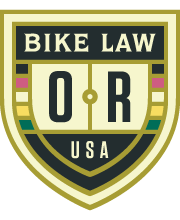Bicycle helmets have been in the news lately. Last month, Bike Law Illinois attorney Brendan Kevenides reported that an Illinois case may have some potential to hold Illinois cyclists liable for their own head injuries if they are hit by a car and are not wearing a helmet. The day before that report came out, a study was released which, among other things, suggested that two-thirds of all bicycling fatalities involved cyclists who were not wearing a helmet. Among the study’s recommendations was the adoption by the states of mandatory helmet laws (For an explanation of why the study was wrong, see Lies, Damned Lies, and Statistics).
With these two recent developments in mind, let’s take a look at what the law in Oregon says about bicycle helmets. Oregon has four separate statutes regarding bicycle helmets. These statutes lay out the legal rights and duties of Oregon cyclists with regard to bicycle helmets.
A Mandatory Helmet Law?
First, are bicycle helmets mandatory in Oregon? For adult cyclists, the answer is a clear “no.” If you are an adult, it is perfectly legal to ride your bike in Oregon without wearing a helmet. In fact, no state in the country has an all-ages mandatory helmet law, although many states do have mandatory helmet laws for minors, and many counties and cities have passed all-ages mandatory helmet laws. (For a survey on the laws nationwide, see Helmet Laws for Bicycle Riders.)
However, Oregon does have a mandatory helmet law for anybody under the age of 16. Here’s how that law works. Anybody who is riding on a bicycle and who is under the age of 16 is required to wear a helmet. This requirement extends to both the operator of the bicycle, as well as any passengers on the bike (see ORS 814.485).
The mandatory helmet law also spells out exactly under what circumstances a helmet is required. It involves a lot of legal descriptions, but the basic idea is this: If you are riding on a place that is used or intended for travel by vehicles, or is open to the public, and you are under the age of 16, you are required to wear a helmet. (For the exact requirements of the law, see ORS 814.485, ORS 801.305, and ORS 801.400).
Oregon law also requires that to meet the requirements of the mandatory helmet law, bicycle helmets must “conform, insofar as practicable, to national safety standards and specifications for such headgear” (See ORS 815.052, OAR 735-102-0030, and 16 CFR Part 1203. See also Bicycle Helmet Standards.
What if you break the mandatory helmet law?
So what happens if you break the mandatory helmet law? To begin with, failure to wear a bicycle helmet when required is a traffic violation, punishable by a maximum fine of $25 (See ORS 814.485).
Additionally, there are two other ways you can break the mandatory helmet law. First, it is against the law to carry a passenger under the age of 16 on your bicycle if the passenger is not wearing a helmet. This means that both you and your passenger could be cited for violating the mandatory helmet law. Second, if you are the “parent, legal guardian or person with legal responsibility for the safety and welfare of a child under 16 years of age,” you are legally responsible if the minor operates or rides on a bicycle without wearing a helmet. This offense is called “endangering a bicycle operator or passenger” and is a traffic violation, also punishable by a maximum fine of $25 (see ORS 814.486).
Are there any exemptions to the law?
In Oregon, there is an exemption to the law. If wearing a helmet would violate a religious belief or practice of the person, a helmet is not required (see ORS 814.487).
There are also a few separate exemptions from the fine: First, if the child is under the age of 12, the citation must be issued to the parent, legal guardian, or other person with legal responsibility for the child, rather than to the child. Second, if the minor is at least 12 years of age but under 16 years, the citation can be issued either to the minor, or the parent (or legal guardian, or other person with legal responsibility for the child), but not to both. Third, the first time a person is convicted of violating the mandatory helmet law, the person “shall not be required to pay a fine if the person proves to the satisfaction of the court that the person has protective headgear of a type approved under ORS 815.052” (see ORS 814.488 and ORS 815.052).
“Is there anything else I need to know?”
There sure is. Oregon’s bicycle helmet laws contain a very important protection for cyclists of any age. In Oregon, a violation of the mandatory helmet law, or evidence of the failure of an adult cyclist to wear a helmet, CANNOT be used in court to reduce the damages or to defend against a claim from a cyclist who is injured or killed by a driver who is either wholly or partially at fault. (See ORS 814.489).
This means that if a negligent or reckless driver injures or kills a cyclist who was not wearing a helmet, the driver’s insurance company cannot argue that the cyclist was at fault for not wearing a helmet, or that the damages owed to the cyclist should be reduced because the cyclist was not wearing a helmet. As an Oregon bicycle accident lawyer, I have seen countless attempts by insurance companies to shift the blame from a negligent or reckless driver to the victim. But in Oregon, the bicycle helmet law protects the rights of cyclists, and holds negligent and reckless drivers accountable for their own negligent and reckless behavior.
Of course, some people believe that cyclists should be held accountable for their own injuries if they are not wearing a helmet and are hit by a driver, even though the crash is the fault of the driver. However, this is not a rational belief. Would we say the same thing about a pedestrian who is struck down in the crosswalk? Of course not. We would immediately recognize that the pedestrian is not to blame for failing to wear protective gear in case a dangerous driver breaks the law and injures them. When somebody is careless or reckless, we don’t allow them to get away with it by saying their victims should have been more careful if they didn’t want to get injured. And in Oregon, that principle is enshrined in the state’s bicycle helmet law.

Bob Mionske is a former U.S. Olympic and pro cyclist, and a nationally-known bicycle accident lawyer based in Portland, Oregon, and affiliated with the Bike Law network. A prolific advocate for the rights of cyclists, Mionske authored Bicycling & the Law in 2007, and has continued his advocacy on behalf of the rights of cyclists with his Road Rights column inBicycling magazine.
***
This article, Oregon Bicycle Helmet Laws: Your Rights and Duties, was originally published on Bike Law on November 12, 2014.







tremendous post – all the important details are there.
anyone want to write up the same for ny? 🙂
it also gives me hope – should the worst come to the worst and mandatory helmet laws ever be passed… i WILL be starting my own religion!